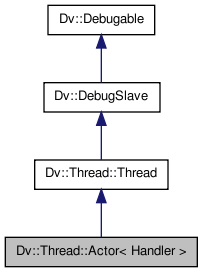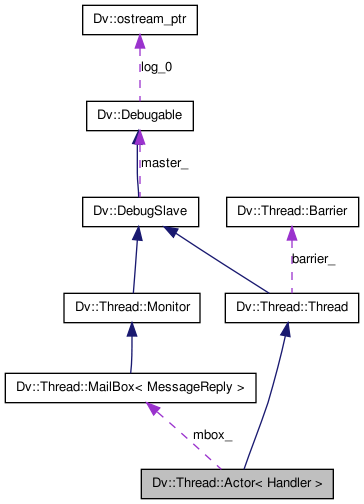Dv::Thread::Actor< Handler > Class Template Reference
An actor is simply a thread with a mailbox. More...
#include <actor.h>


Public Types | |
| typedef Handler::argument_type | Message |
| typedef Handler::result_type | Reply |
| typedef MailBox< Reply > | ReplyBox |
| typedef std::pair< Message, ReplyBox * > | MessageReply |
Public Member Functions | |
| Actor (const std::string &name, Handler &handler, size_t delay=2000, size_t max_capacity=0, unsigned int min_debug_level=0, Debugable *debug_master=0) | |
| Constructor. | |
| ~Actor () | |
| Destructor. | |
| void | request (const Message &m, ReplyBox *r=0) |
| Send a request to an actor, with an optional mailbox to which a reply may be sent. | |
| int | main () |
| The default life of an actor. | |
| const std::string & | name () const |
Private Attributes | |
| std::string | name_ |
| size_t | delay_ |
| Handler & | handler_ |
| MailBox< MessageReply > | mbox_ |
Detailed Description
template<typename Handler>
class Dv::Thread::Actor< Handler >
An actor is simply a thread with a mailbox.
The mailbox is the interface to the thread: whenever a request is made, a message is put in the mailbox, the thread goes to work. If the request includes a return mailbox, the result of the work will be put there (the return mailbox).
The template parameter Handler should be derived from std::unary_function<Message,Reply> where Message is the type of the messages the actor expects in its inbox and Reply the type of message that the actor will use to reply
Member Typedef Documentation
| typedef Handler::argument_type Dv::Thread::Actor< Handler >::Message |
| typedef Handler::result_type Dv::Thread::Actor< Handler >::Reply |
| typedef MailBox<Reply> Dv::Thread::Actor< Handler >::ReplyBox |
| typedef std::pair<Message,ReplyBox*> Dv::Thread::Actor< Handler >::MessageReply |
Constructor & Destructor Documentation
| Dv::Thread::Actor< Handler >::Actor | ( | const std::string & | name, | |
| Handler & | handler, | |||
| size_t | delay = 2000, |
|||
| size_t | max_capacity = 0, |
|||
| unsigned int | min_debug_level = 0, |
|||
| Debugable * | debug_master = 0 | |||
| ) | [inline] |
Constructor.
The constructor also starts the thread.
- Parameters:
-
name of this actor handler function this function will be called with a received message as parameter; it is assumed to return a reply if necessary. delay in millisecs that an actor will wait for a message on an inbox, before giving up (and checking whether it has been killed) max_capacity of the actor mailbox min_debug_level debug_master
References Dv::Thread::Thread::start().
| Dv::Thread::Actor< Handler >::~Actor | ( | ) | [inline] |
Destructor.
Member Function Documentation
| void Dv::Thread::Actor< Handler >::request | ( | const Message & | m, | |
| ReplyBox * | r = 0 | |||
| ) | [inline] |
Send a request to an actor, with an optional mailbox to which a reply may be sent.
- Parameters:
-
m request message r pointer (may be 0) to optional mailbox. If not zero, the actor will put a reply on this mailbox.
References Dv::Thread::Actor< Handler >::mbox_, and Dv::Thread::MailBox< M >::put().
| int Dv::Thread::Actor< Handler >::main | ( | ) | [inline, virtual] |
The default life of an actor.
Reimplemented from Dv::Thread::Thread.
References Dv::Thread::Actor< Handler >::delay_, Dv::Thread::MailBox< M >::get(), Dv::Thread::Actor< Handler >::handler_, Dv::Thread::Thread::killed(), and Dv::Thread::Actor< Handler >::mbox_.
| const std::string& Dv::Thread::Actor< Handler >::name | ( | ) | const [inline] |
- Returns:
- the name of this actor.
References Dv::Thread::Actor< Handler >::name_.
Member Data Documentation
std::string Dv::Thread::Actor< Handler >::name_ [private] |
Referenced by Dv::Thread::Actor< Handler >::name().
size_t Dv::Thread::Actor< Handler >::delay_ [private] |
Referenced by Dv::Thread::Actor< Handler >::main().
Handler& Dv::Thread::Actor< Handler >::handler_ [private] |
Referenced by Dv::Thread::Actor< Handler >::main().
MailBox<MessageReply> Dv::Thread::Actor< Handler >::mbox_ [private] |
Referenced by Dv::Thread::Actor< Handler >::main(), and Dv::Thread::Actor< Handler >::request().
The documentation for this class was generated from the following file: